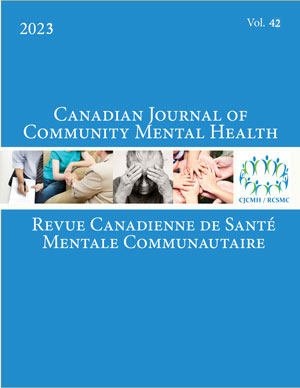Volume 42 • Number 2 • August 2023
Articles
Modular housing is a temporary and transitional housing program in British Columbia. This qualitative study gathered the perceived needs of residents at modular housing sites to determine how service delivery impacts care continuity and well-being. Twenty-five residents at four modular housing sites in an urban setting participated in focus groups and semi-structured interviews. Thematic content analysis was used to summarize key findings. Themes highlight the need for flexible, person-centred, and tailored supports. Participants also voiced the importance of communication during times of transition into modular housing, as well as the impact of the environment on safety and autonomy.
Violent encounters and safety concerns are common among paramedics attending to 911 emergency calls. These concerns are particularly salient for paramedics attending to mental health and substance use calls. This article draws on data from a qualitative case study. Findings include paramedics’ reported perceptions and experiences of violence experienced on mental health calls, success with de-escalation of those in distress, and paramedics challenging the notion that all individuals with mental distress are violent. The article explores tensions between attention to care providers’ and care recipients’ safety, the contexts in which this care takes place, and equity concerns related to appropriately managing mental health emergencies.
We investigated the feasibility and effectiveness of an Action-Based Cognitive Remediation group within an outpatient early psychosis program. Sixteen participants completed the group including pre-post measures to assess quantitative outcomes of improvement. Eight participants completed individual, semistructured, qualitative interviews at 3–6 months post-intervention to assess feasibility and acceptability. The group was well tolerated. Significant improvements were observed in general cognition and functional capacity, which extended to psychiatric symptoms and illness stigma. Participants identified themes related to improved cognition and self-esteem, as well as generalizing skills to everyday activities. Action-Based Cognitive Remediation is a feasible and efficacious intervention for early psychosis.
Assertive Community Treatment (ACT) teams provide the most intensive care for patients with serious mental illness. This online study surveyed the 88 ACT and Flexible ACT (FACT) teams in Ontario, Canada (144/232 surveys, 62.1%) during the height of Covid-19 in 2021, and qualitative thematic analysis on impact of team function and patient outcome showed challenges of teams switching to virtual care, reduced psychosocial services, division to smaller groups, staff redeployment, having unequal compensations, and exacerbated regional differences; there were also increased patient stress, loneliness, hospital and ER visits, substance use and related deaths, and police/crisis team involvement. There was limited morbidity related to actual Covid-19; and positive adaptations included observed independence and resilience, increased interdependence with community partners, and new communication formats.
Practice Innovations
We introduce the innovative components of a primary care pathway for child and youth mental health (MH) in Ontario. We share our experiences with developing and implementing the pathway that supports inter-provider communication, standardized screening, timely access to community MH services, and is adaptable to different services and settings.
The challenge of providing a virtual Dialectical Behavior Therapy (DBT) group to high-risk youth involves managing the neurodiverse needs and attention struggles of participants. This initiative focused on enhancing youth engagement in a DBT virtual group program by developing an asynchronous learning approach to a DBT skills program and including a parent/guardian component.
This article describes the process used by Youth Wellness Hubs Ontario to integrate the rigour of conventional funding allocation processes with authentic engagement and equity-centred processes in youth mental health. This approach may provide a model for others aiming to implement equity and engagement funding allocation processes for integrated care.
This article explores how school staff may enhance their capacity to support and affirm 2SLGBTQIA+ youth by meaningfully participating in hands-on professional development and implementing structured mental health promotion and healthy relationships programming in gender and sexuality alliances or other educational venues.









